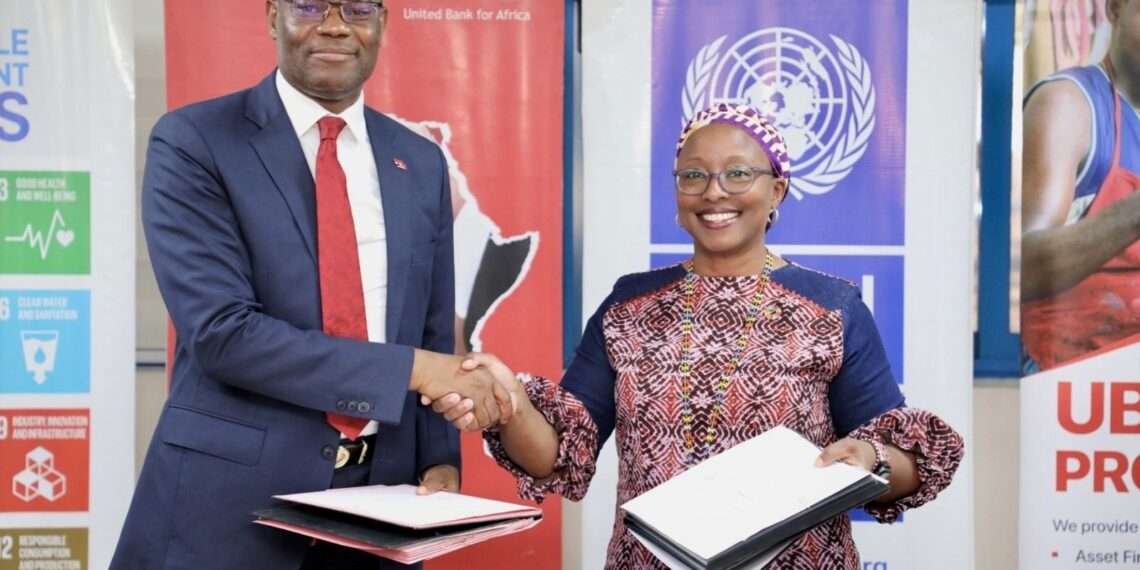UBA Ghana and the United Nations Development Programme (UNDP) have signed a Memorandum of Understanding (MoU) to support youth and women-led micro, small and medium scale enterprises (MSMEs) in Ghana.
By this partnership, the parties will co-develop and implement a suite of innovative programmes and mechanisms to strengthen the institutional capacity of UBA Ghana to access climate financing schemes, including the Green Climate Fund (GCF).
Mr Chris Ofikulu, the Managing Director of UBA Ghana and Regional Chief Executive Officer of UBA West Africa, said the partnership is a welcome development as UBA Ghana specialised in providing innovative financing to businesses, including SMEs.
Mr Chris Ofikulu noted saying, “collaborating with UNDP demonstrates UBA Ghana’s commitment to supporting the Sustainable Development Goals (SDGs), with a particular focus on providing custom financial solutions and growth opportunities for businesses of all sizes to facilitate inter–and-intraAfrican trade”.
The Managing Director of UBA Ghana explained that the businesses would also receive a tailored programme of service support and capacity development in areas including corporate governance, branding, marketing, financial support, and product design/development to enable easier access to markets for their products and services. They will also be supported with energy efficiency audits and remedial actions to minimise their carbon footprints, he added.
UNDPWorking to Influence the Flow Of Resources Towards Development
Dr. Angela Lusigi, the UNDP Resident Representative in Ghana, on her part, said “The UNDP is working to influence the flow of resources towards development by encouraging investors and businesses of all sizes to embed the SDGs and Climate action into their analytics, decision making and business practices”.
Dr. Angela Lusigi explained that the MoU would promote Inclusive, resilient and green entrepreneurship, by leveraging UNDP’s expertise in working with MSMEs and innovators, and UBA Ghana’s expertise in supporting businesses.
The partnership is expected to scale up youth and women-led MSMEs, increase jobs, drive revenue and contribute significantly towards the reduction of environmental footprint. it will also help to access climate financing schemes and increase financial inflows from climate funding channels in order to support Ghana’s efforts to turn climate commitments into actions.
Undoubtedly, SMEs and small-scale industries continue to play a vital role in boosting socio-economic growth in the country and more women are at the forefront of it. In Ghana and the rest of Africa, there is a growing number of women who become critical drivers in accelerating sustainable socio-economic development.
Over the years, women have been the backbone of the Ghanaian economy; contributing significantly to economic growth and development. The World Bank estimates that 44 per cent of MSMEs in Ghana are women-owned. In 2020, the Mastercard Index of Women Entrepreneurs (MIWE) ranked Ghana (36.5percent) among the world’s three leading economies with most women-owned businesses with Uganda (39.6percent) and Botswana (38.5percent).
The country has committed to efforts in climate change mitigation, addressing environmental challenges and transitioning to a green economy. This is reflected in the Ghana National Climate Change Policy of 2013, as well as the Shared Growth and Development Agenda and the National Medium-Term Development Policy Framework (2018-2021).
In its Nationally Determined Contributions (NDCs), Ghana defines energy, agriculture and waste, among others, as priority sectors. Addressing these goals and creating new innovations requires not only efforts by public actors but also active engagement by private sector enterprises in order to promote the growth and establishment of ecologically and socially sustainable small and medium-sized enterprises (SMEs).
READ ALSO: Tema Oil Refinery MD Resigns





















